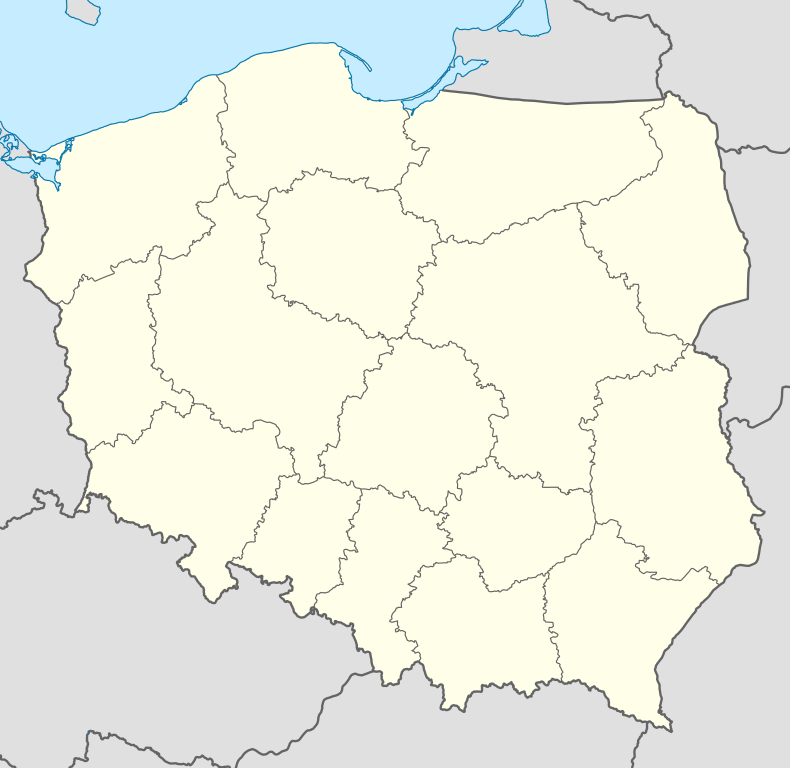Oława
| Oława | |||
|---|---|---|---|
|
Church on the town square | |||
| |||
 Oława | |||
| Coordinates: 50°56′N 17°18′E / 50.933°N 17.300°E | |||
| Country |
| ||
| Voivodeship | Lower Silesian | ||
| County | Oława County | ||
| Gmina | Oława (urban gmina) | ||
| Government | |||
| • Mayor | Franciszek Październik | ||
| Area | |||
| • Total | 27.34 km2 (10.56 sq mi) | ||
| Population (2006) | |||
| • Total | 30,908 | ||
| • Density | 1,100/km2 (2,900/sq mi) | ||
| Time zone | CET (UTC+1) | ||
| • Summer (DST) | CEST (UTC+2) | ||
| Postal code | 55-200 | ||
| Car plates | DOA | ||
| Website | http://www.um.olawa.pl | ||
Oława [ɔˈwava] (German: ![]() Ohlau ) is a town in south-western Poland with 31,078 inhabitants (2005). It is situated in Lower Silesian Voivodeship (from 1975–1998 it was in the former Wrocław Voivodeship). It is the seat of Oława County, and also of the smaller administrative district of Gmina Oława (although it is not part of the territory of the latter, as the town is an urban gmina in its own right).
Ohlau ) is a town in south-western Poland with 31,078 inhabitants (2005). It is situated in Lower Silesian Voivodeship (from 1975–1998 it was in the former Wrocław Voivodeship). It is the seat of Oława County, and also of the smaller administrative district of Gmina Oława (although it is not part of the territory of the latter, as the town is an urban gmina in its own right).
Oława began to develop during the early 12th century at a site that was protected by the rivers Oder and Oława. It was first mentioned as Oloua in a document of 1149 confirming its donation to the abbey of St. Vincent in Wrocław. In 1206 Oława became one of the residence towns of the dukes of the Silesian Piast dynasty, who also granted Oława the status of a town in 1234. During its history Oława was destroyed completely three times. In 1241 it was destroyed during the Mongol invasion of Europe, in 1448 by the Hussites, and again in 1634 during the Thirty Years' War. After the Polish King Casimir III had renounced his rights on Silesia with the contract of Trenčín in 1335, Silesia became until 1806 a part of the Holy Roman Empire as a Bohemian fief. In 1526, when the Habsburgs gained the Bohemian crown, Silesia came under Austrian sovereignty. In 1527 with the Reformation High German language came in use and with it the first usage of the version of the town's name("Ohlau") is reported . After the death of the last Silesian Piast duke George IV William of Legnica in 1675, Ohlau ceased to be a residence town. Together with most of Silesia, the town became part of the Kingdom of Prussia in 1741. The 18th and 19th centuries were a period of economic growth and Ohlau became well known as a centre of tobacco-growing. Ethnic Polish traditions and population also remained strong in the area, with a large influx of people from nearby Congress Poland. In 1842 a railroad between Ohlau and Breslau, the first in Silesia, was opened.
George Gellhorn, father of Martha Gellhorn, was born and grew up here.
The historic town of Ohlau did not suffer any damage during World War I, because there were no fightings in Silesia. However in World War II about 60% of the town was destroyed. On 2 September 1939, one Polish PZL.23 Karaś bomber (scout) plane did bomb a German factory within the city in the first attack on German territory during the war. As Oława it became part of Poland in 1945 and its whole German population was expelled. After the war, Oława became a garrison town of the Red Army Northern Group of Forces and remained so until 1992.
People from Oława
- Maria Karolina Sobieska, (1697–1740) duchesse de Bouillon, daughter of James Louis Sobieski.
- Maria Clementina Sobieska, (1702–1735) wife of the Jacobite pretender James Francis Edward Stuart, sister of the above.
- Johann Baptist Alzog, (1808–1878) German theologian and Catholic church historian.
- Alfred Israel Pringsheim, (1850–1941) German mathematician and patron of the arts
- Hermann Eberhard (1852–1908), German explorer
- Bernhard Lichtenberg (1875–1943) German Roman Catholic priest and theologian, awarded the title righteous among the Nations.
- Richard Peter, (1895–1977) German photographer, born in Klein Jenkwitz near Ohlau
- Bernd Eistert, (1902–1978) German chemist
- Peter Yorck von Wartenburg, (1904–1944) German jurist and a member of the German Resistance against Nazism
- Adam Wójcik, (1970-present) Polish basketball player, 8-time Polish champion.
- Szymon Kołecki, (1981–present) Polish weightlifter who achieved silver medals at 2002 Olympic Games in Athens and 2008 Olympic Games in Beijing.
- Janusz Gancarczyk, (1984–present) Polish footballer who plays for Polonia Warszawa.
- Marek Gancarczyk, (1983–present) Polish footballer who plays for Śląsk Wrocław.
See also
- PZL.23 Karas#Operational history
External links
- (English) Municipal website
- Jewish Community in Oława on Virtual Shtetl
| Wikimedia Commons has media related to Oława. |
| |||||||||||||||||


